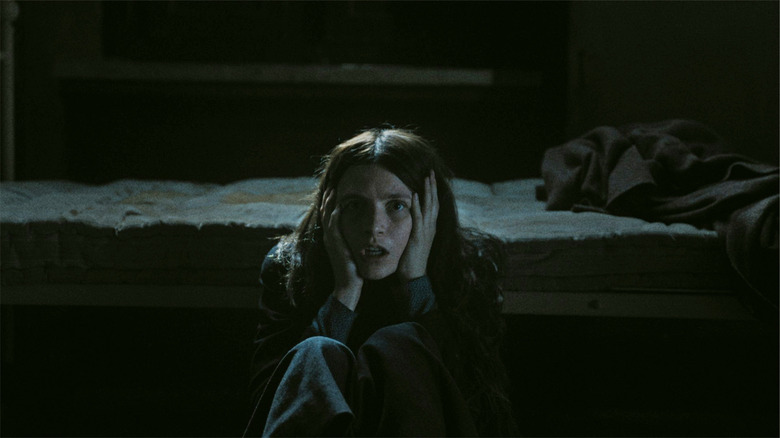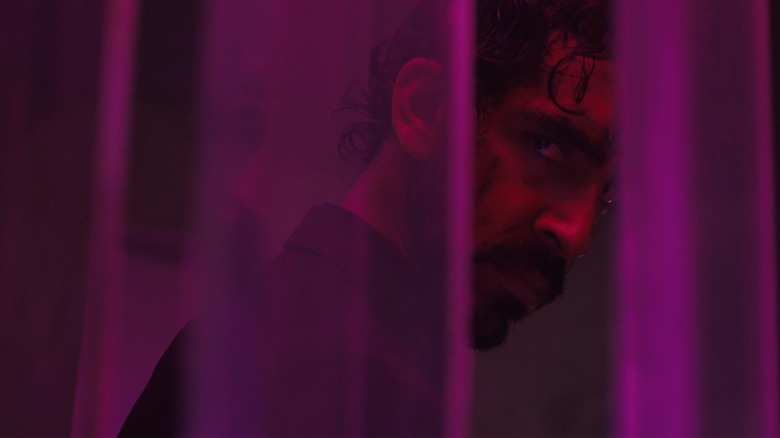Monkey Man And The First Omen Aren't Massive Box Office Hits — But They Don't Need To Be
Over the weekend, Universal Pictures released Dev Patel's action flick "Monkey Man" in theaters, while 20th Century Studios unleashed the horror prequel "The First Omen" on audiences. Both were competing against "Godzilla x Kong: The New Empire" in its second weekend and, frankly, they never stood a chance. But they also weren't necessarily gunning for the top spot as these were more counterprogramming moves from both studios. Be that as it may, both films came in on the lower end of expectations, which shaped the narrative around their performance to something akin to "bad." I'm here to offer the other perspective which is more akin to "good."
"Monkey Man" debuted at number two on the charts with a $10.1 million opening. The film, which serves as Patel's feature directorial debut, had been expected to pull in anywhere between $16 and $25 million on the more optimistic side of things That obviously didn't come to pass. Meanwhile, Arkasha Stevenson's "The First Omen" opened at number four on the charts with $8.3 million. That was, similarly, on the very low end of projections as forecasts had it taking in between $8 and $13 million. So yes, at first glance, it's not difficult to see why these openings might be viewed, respectively, as disappointing on some level.
That said, the bigger picture is very important here. Starting with "Monkey Man," we're talking about a movie that was originally destined to go directly to Netflix and had been sitting on a shelf collecting dust for something like two years. Universal and Jordan Peele rescued it from oblivion. And as for "The First Omen," this is a movie that Disney was originally going to dump directly to Hulu. Instead, it got a theatrical release and brought a not-insignificant amount of business to theaters at a time when they could surely use it. There is much more to be said on behalf of both films.
Monkey Man and The First Omen are better off in theaters
As of this writing, "Monkey Man" has made just over $12 million domestically and still has a huge portion of its international rollout on deck. So it still has plenty of time to make up ground. Let's also not forget that Universal paid less than $10 million to acquire the film, which has since garnered rave reviews from critics and audiences alike. That means it has better odds of having a longer shelf life. Its fate seems better now even if its box office run may be somewhat muted. It might have otherwise run the risk of being forgotten by Netflix's unforgiving algorithm. It's hard to overestimate the good will that Universal purchased by saving this movie — one that features an almost entirely Indian cast — from an uncertain fate.
"The First Omen," similarly, has been embraced by many audiences and critics as a genuinely fantastic prequel to a beloved horror classic. Sure, it carries a bigger budget in the $30 million range, but that money was originally spent on a movie that was going to go straight to Hulu with no theatrical revenue to speak of. Now? It's already made $19 million globally and could leg out much like "The Boogeyman" did for 20th Century Studios last year after a so-so opening. Even if it doesn't, it should recoup a good portion of the budget in ticket sales and have a higher profile by the time it eventually does hit Hulu. Either way, this is a far better situation.
We're looking at two movies that will benefit from a wide theatrical release when they could have easily fallen victim to the endless sea of streaming "content." Theaters get some buzzy new titles to show, both studios get some revenue, and the optics are better for all involved. Could the openings have been better? Sure, but I don't see any reason to be so down on what still boils down to a net win for the industry.
"Monkey Man" and "The First Omen" are in theaters now.

